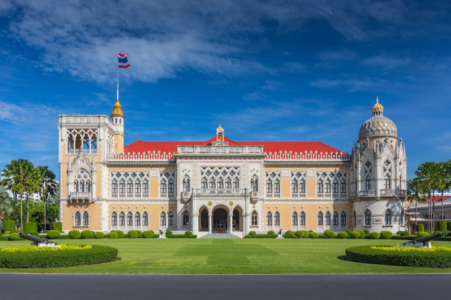Amid the disbandment of a leading opposition party and the swift replacement of the prime minister, CNA’s Saksith Saiyasombut breaks down what’s unfolding in Thai politics.
BANGKOK: Thailand’s political landscape was rocked in August 2023, beginning with the Constitutional Court’s decision on August 7 to dissolve the opposition Move Forward Party. This marked the start of a tumultuous period that saw Prime Minister Srettha Thavisin disqualified just a week later, and Paetongtarn Shinawatra, daughter of former prime minister Thaksin Shinawatra, swiftly appointed to replace him. The political upheaval was capped off by a royal pardon for Thaksin, who had been serving a prison sentence after his return to Thailand, shortening his parole just as his daughter assumed office.
Why Was Move Forward Dissolved?
The Constitutional Court declared Move Forward a “threat to the constitutional monarchy,” citing the party’s push for amending the royal insult law, which the court deemed as treasonous. This dramatic development came just a year after the party’s strong performance in the general elections, only to be thwarted by political rivals blocking their attempt to form a government. The ruling led to the ban of Move Forward’s leader, Pita Limjaroenrat, and 10 other party executives, preventing them from holding political office for the next decade.
For many of the party’s supporters, the dissolution wasn’t just a legal blow; it represented the government’s hardline stance against political reform and an extension of the crackdown on dissent. This move also echoes the 2020 dissolution of the Future Forward Party, a predecessor to Move Forward, which had similarly advocated for reforms targeting the monarchy and the military.
What’s Next for Progressive Politics in Thailand?
Despite the setback, Move Forward’s remaining MPs and members regrouped under the new banner of the People’s Party. They’ve adopted the familiar color and logo, signaling that their progressive agenda is far from over. The party, led by 37-year-old Natthaphong Ruengpanyawut, has quickly gained support, with over 62,000 new members joining within a week of its launch. However, legal threats loom large, as an ethics probe into 44 former Move Forward members could result in more political bans and the loss of seats.
Why Did Srettha Have to Go?
Srettha’s downfall came swiftly after the Constitutional Court found him guilty of ethical misconduct in his nomination of Phichit Chuenban as a cabinet minister, despite the latter’s criminal conviction for attempted bribery. The court’s verdict dismissed Srettha’s defense that, as a former property tycoon without public administration experience, he was unaware of Phichit’s disqualification. The disqualification of Srettha, just short of his first year in office, came as a shock to both his administration and the public.
How Did Paetongtarn Become Prime Minister?
The sudden ousting of Srettha sparked rapid discussions within the ruling Pheu Thai Party. Within 24 hours of the court’s ruling, the party’s leaders, including former prime minister Thaksin Shinawatra, were seen gathering to decide on a replacement. Initially, former attorney-general Chaikasem Nitisiri was favored, but ultimately, the party’s MPs rallied around Paetongtarn Shinawatra, Thaksin’s youngest daughter. Her nomination was confirmed in parliament, and within 72 hours, she was sworn in as Thailand’s 31st prime minister.
Despite being a political newcomer, Paetongtarn’s appointment is not surprising. She had been active in her father’s political campaigns from a young age and had already demonstrated her determination by running for office during her pregnancy. At 38 years old, she has already established herself as a strong voice within Pheu Thai.
Will Thaksin Play a Role in the New Government?
Thaksin’s return to Thailand in August 2022, after 15 years of self-imposed exile, coincided with Srettha’s confirmation as prime minister. His return has been closely tied to the political fate of his family’s party, with Thaksin’s influence remaining strong within Pheu Thai, despite his lack of an official position. His involvement in the party’s affairs continues to raise questions about the role of political dynasties in Thai governance.
While Paetongtarn has assured the public that she is her “own person” and would not solely rely on her father’s influence, it is clear that Thaksin’s presence still looms large over Thai politics. He has already paid a high price for his political ambitions, and as the father of the country’s new prime minister, his influence is unlikely to fade.
Will Thailand’s Politics Find Stability?
As Thailand’s political landscape evolves, questions about the future remain unanswered. The recent actions of the judiciary and the rapid succession of prime ministers have left many wondering whether democracy in Thailand is being undermined by an unelected elite. For the millions of voters who supported Move Forward and Pheu Thai, the recent events signal that their votes may not be enough to break the political status quo.
With growing support for the People’s Party and ongoing protests against the political establishment, it’s clear that Thailand’s political future remains in flux. Paetongtarn’s leadership marks a new chapter in the Shinawatra family’s political dynasty, but whether it can survive the pressures of the opposition and its internal challenges remains to be seen.
The ongoing political unrest, legal battles, and the clash of ideologies indicate that Thailand’s path to stability will be anything but smooth. As the country enters a new era under its latest prime minister, the real question remains: Will this be the dawn of a new era for Thai democracy, or will the political elite continue to hold sway?








